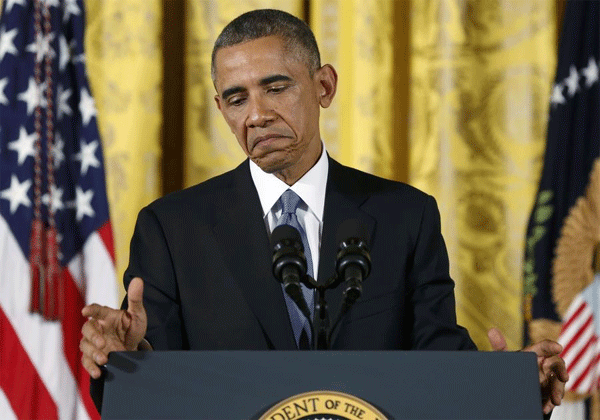WASHINGTON - President Barack Obama and the incoming Republican Senate majority leader pledged Wednesday to find common ground and try to overcome Washington's chronic gridlock, while also warning of inevitable conflicts a day after sweeping Republican gains in midterm elections.
|
 |
| US President Barack Obama gestures during a a news conference in the East Room of the White House in Washington, November 5, 2014. [Photo/Agencies] |
Obama said he heard the message from voters who on Tuesday put Republicans in power in the US Senate and extended their majority in the House of Representatives, in a clear repudiation of the president's leadership.
"There is no doubt that Republicans had a good night," the president said at the White House.
Obama said he is eager to hear Republican ideas for governing together, citing trade expansion and construction of roads, bridges and other facilities as areas ripe for cooperation. Republican Senate leader Mitch McConnell, who will become the Senate majority leader when the new Congress takes over in January, also said there was potential for agreement on trade pacts.
At the same time, Obama noted, "Congress will pass some bills I cannot sign. I'm pretty sure I will take some actions that some in Congress will not like."
Tuesday's vote gives Republicans momentum heading into the 2016 presidential race, which becomes the focus of American politics for the next two years. At issue now is whether Obama, congressional Democrats and the newly robust Republican majorities will be able to break the partisan fighting and legislative inaction that has gripped the US capital in recent years.
Immigration, which has been seen as potential point of agreement, immediately emerged as an early irritant.
Obama said that unless Congress takes action by the end of the year, he will order a reduction in deportations of working immigrants living in the country illegally.
He made his pledge a short while after McConnell warned that any executive action that Obama might take on immigration would only antagonize Republicans. He said the new Republican majority in the Senate wants to act on immigration.
"It's like waving a red flag in front of a bull to say if you guys don't do what I want I'm going to do it on my own," McConnell said at a news conference in Kentucky, where he won re-election.
McConnell said he spoke with Obama on Wednesday and says he looks forward to finding areas where Republicans and Democrats can agree, including rewriting the tax code.
Beyond that, he made it clear Congress will vote on legislation to approve the Keystone XL oil pipeline from Canada through the United States, and work to repeal portions of the health care law that stands as Obama's signature domestic accomplishment. He said a tax on medical devices and a mandate for individuals to purchase health insurance are Republican targets.
Obama ruled out ending the requirement for purchasing of health care, a part of the health law Republicans repudiate as a government overreach. But he pointedly did not reject repeal of the tax, which many Democrats as well as Republicans have already signaled they are ready to jettison.
Republicans are also expected to mount a major attack on federal deficits.
With lawmakers planning to return to Washington next week, Obama invited congressional leaders to a meeting Friday.
Obama could use the president's veto power if Republicans pass bills he opposes, such as a repeal of the health care law. Overriding a presidential veto requires a two-thirds vote in each chamber of Congress, an unlikely scenario.
McConnell has been a severe critic of Obama, but has also helped broker bipartisan deals that ended last year's government shutdown and twice averted federal default.
He promised Wednesday that "there will be no government shutdown or default on the national debt." Still, he said veto showdowns are also possible in the two-year era of divided government just ahead.
McConnell, 72 and famously taciturn, smiled and joked with reporters one day after the fulfillment of a lifelong dream. He and House Speaker John Boehner will have the authority to set the congressional agenda.
In an op-ed for Thursday's editions of The Wall Street Journal, McConnell and Boehner made their case for a Republican legislative agenda aimed at jobs and the economy. Their list of priorities for the 114th Congress included addressing the tax code, terrorism, school choice, government regulations, the national debt and other longtime targets that Republicans have been unable to strike during the Obama administration.
Republicans picked up at least seven Senate seats, giving them at least 52 in the 100-member Senate. They could gain two more in uncalled races in Alaska and Virginia, and a third in Louisiana, which headed for a Dec. 6 runoff.
Republicans had made Obama's presidency the core issue of their campaigns, even though he wasn't on the ballot. They tapped into a well of discouragement at a time many Americans are upset with a sluggish economic recovery and are besieged by troubling news, such as the spread of Ebola and the rapid rise of Islamic State militants in Iraq and Syria.
Nearly two-thirds of voters interviewed after casting ballots said the US was seriously on the wrong track. Only about 30 percent said the US was headed in the right direction.
In the House, Republicans were on track to meet or exceed the 246 seats they held during Democrat President Harry S. Truman's administration more than 60 years ago.
